分句、合句法翻译
- 格式:docx
- 大小:17.90 KB
- 文档页数:6
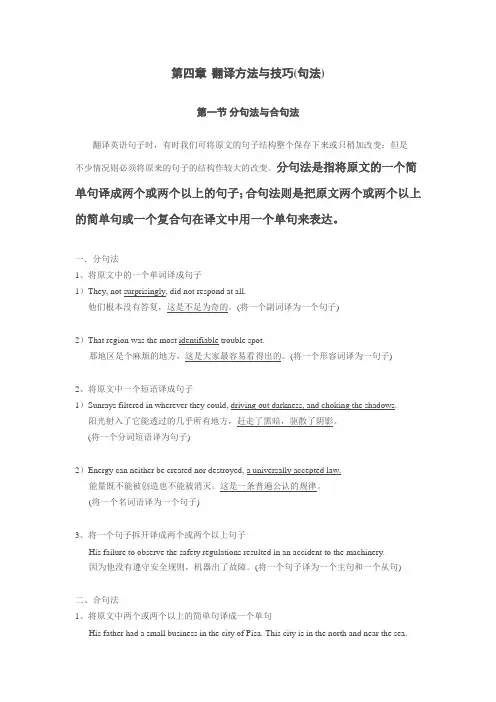
第四章翻译方法与技巧(句法)第一节分句法与合句法翻译英语句子时,有时我们可将原文的句子结构整个保存下来或只稍加改变;但是不少情况则必须将原来的句子的结构作较大的改变。
分句法是指将原文的一个简单句译成两个或两个以上的句子;合句法则是把原文两个或两个以上的简单句或一个复合句在译文中用一个单句来表达。
一.分句法1、将原文中的一个单词译成句子1)They, not surprisingly, did not respond at all.他们根本没有答复,这是不足为奇的。
(将一个副词译为一个句子)2)That region was the most identifiable trouble spot.那地区是个麻烦的地方,这是大家最容易看得出的。
(将一个形容词译为一句子)2、将原文中一个短语译成句子1)Sunrays filtered in wherever they could, driving out darkness, and choking the shadows.阳光射入了它能透过的几乎所有地方,赶走了黑暗,驱散了阴影。
(将一个分词短语译为句子)能量既不能被创造也不能被消灭。
这是一条普遍公认的规律。
(将一个名词语译为一个句子)3、将一个句子拆开译成两个或两个以上句子His failure to observe the safety regulations resulted in an accident to the machinery.因为他没有遵守安全规则,机器出了故障。
(将一个句子译为一个主句和一个从句)二、合句法1、将原文中两个或两个以上的简单句译成一个单句His father had a small business in the city of Pisa. This city is in the north and near the sea.他的父亲在意大利北部近海的比萨做小生意。
(将两个单句译为一个单句)2、将原文中的主从复合句译成一个单句When I negotiate, I get nervous. When I get nervous, I eat.我在谈判时总是有些紧张。
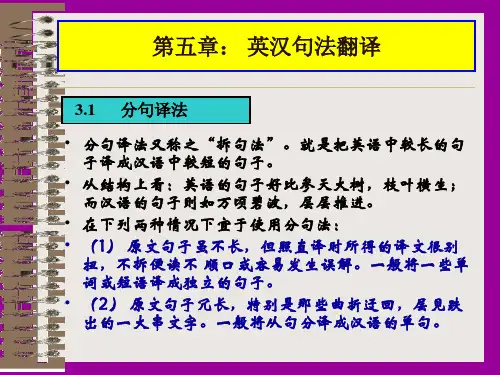

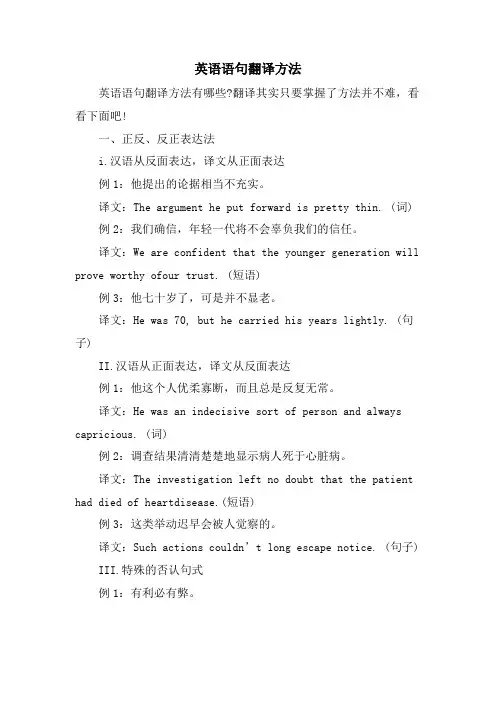
英语语句翻译方法英语语句翻译方法有哪些?翻译其实只要掌握了方法并不难,看看下面吧!一、正反、反正表达法i.汉语从反面表达,译文从正面表达例1:他提出的论据相当不充实。
译文:The argument he put forward is pretty thin. (词) 例2:我们确信,年轻一代将不会辜负我们的信任。
译文:We are confident that the younger generation will prove worthy ofour trust. (短语)例3:他七十岁了,可是并不显老。
译文:He was 70, but he carried his years lightly. (句子)II.汉语从正面表达,译文从反面表达例1:他这个人优柔寡断,而且总是反复无常。
译文:He was an indecisive sort of person and always capricious. (词)例2:调查结果清清楚楚地显示病人死于心脏病。
译文:The investigation left no doubt that the patient had died of heartdisease.(短语)例3:这类举动迟早会被人觉察的。
译文:Such actions couldn’t long escape notice. (句子) III.特殊的否认句式例1:有利必有弊。
译文:There is not any advantage without disadvantage. (双重否认)例2:我们在那个城市从未因为是犹太人而遭受歧视。
译文:In that city, we had never suffereddiscrimination because we wereJews. (否认转移)二、分句、合句法I.分句法汉译英时,需要分译的句子多数是长句,或者是构造复杂的复句。
这种句子如果译成一个长句,就会使译文冗长、累赘、意思表达不清楚,也不符合英文习惯。

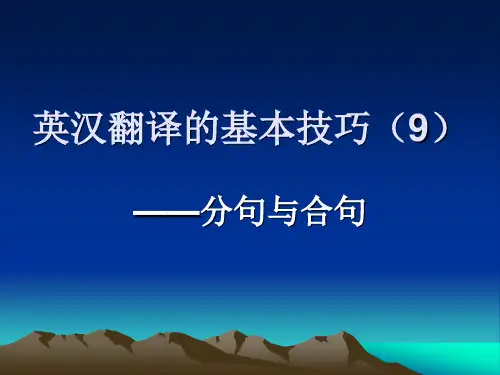

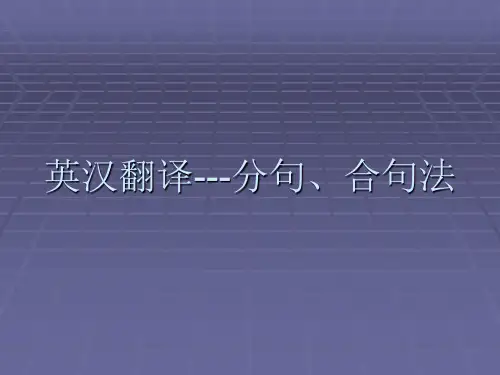
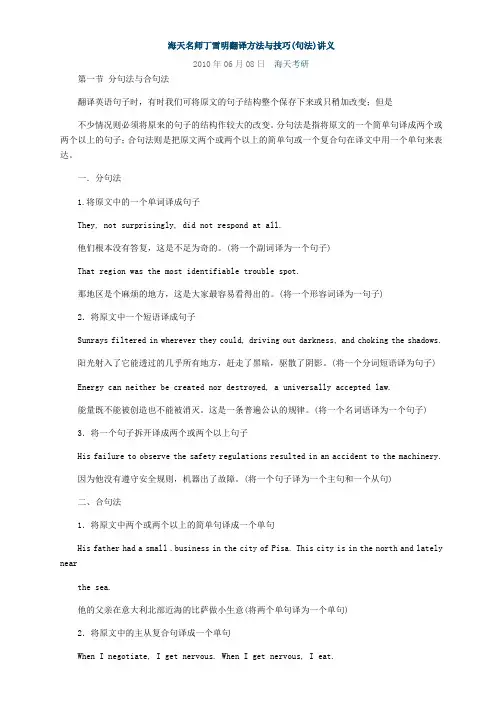
海天名师丁雪明翻译方法与技巧(句法)讲义2010年06月08日海天考研第一节分句法与合句法翻译英语句子时,有时我们可将原文的句子结构整个保存下来或只稍加改变;但是不少情况则必须将原来的句子的结构作较大的改变。
分句法是指将原文的一个简单句译成两个或两个以上的句子;合句法则是把原文两个或两个以上的简单句或一个复合句在译文中用一个单句来表达。
一.分句法1.将原文中的一个单词译成句子They, not surprisingly, did not respond at all.他们根本没有答复,这是不足为奇的。
(将一个副词译为一个句子)That region was the most identifiable trouble spot.那地区是个麻烦的地方,这是大家最容易看得出的。
(将一个形容词译为一句子)2.将原文中一个短语译成句子Sunrays filtered in wherever they could, driving out darkness, and choking the shadows.阳光射入了它能透过的几乎所有地方,赶走了黑暗,驱散了阴影。
(将一个分词短语译为句子)Energy can neither be created nor destroyed, a universally accepted law.能量既不能被创造也不能被消灭。
这是一条普遍公认的规律。
(将一个名词语译为一个句子)3.将一个句子拆开译成两个或两个以上句子His failure to observe the safety regulations resulted in an accident to the machinery.因为他没有遵守安全规则,机器出了故障。
(将一个句子译为一个主句和一个从句)二、合句法1.将原文中两个或两个以上的简单句译成一个单句His father had a small .business in the city of Pisa. This city is in the north and lately nearthe sea.他的父亲在意大利北部近海的比萨做小生意(将两个单句译为一个单句)2.将原文中的主从复合句译成一个单句When I negotiate, I get nervous. When I get nervous, I eat.我在谈判时总是有些紧张。

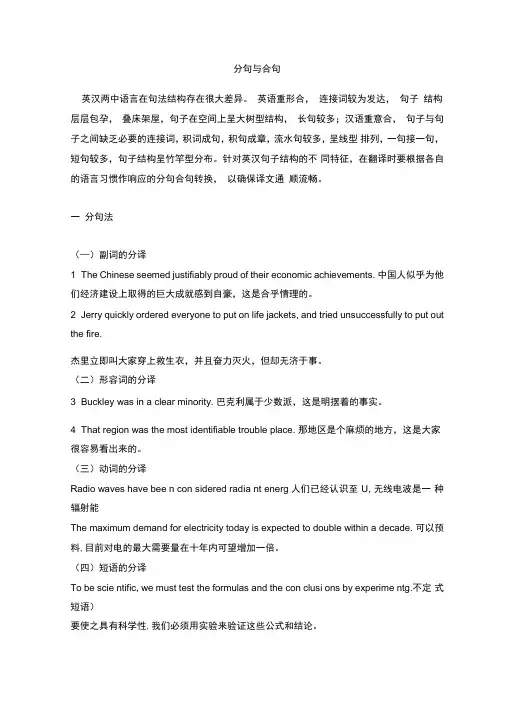
分句与合句英汉两中语言在句法结构存在很大差异。
英语重形合,连接词较为发达,句子结构层层包孕,叠床架屋,句子在空间上呈大树型结构,长句较多;汉语重意合,句子与句子之间缺乏必要的连接词,积词成句,积句成章,流水句较多,呈线型排列,一句接一句,短句较多,句子结构呈竹竿型分布。
针对英汉句子结构的不同特征,在翻译时要根据各自的语言习惯作响应的分句合句转换,以确保译文通顺流畅。
一分句法(—)副词的分译1 The Chinese seemed justifiably proud of their economic achievements. 中国人似乎为他们经济建设上取得的巨大成就感到自豪,这是合乎情理的。
2 Jerry quickly ordered everyone to put on life jackets, and tried unsuccessfully to put out the fire.杰里立即叫大家穿上救生衣,并且奋力灭火,但却无济于事。
(二)形容词的分译3 Buckley was in a clear minority. 巴克利属于少数派,这是明摆着的事实。
4 That region was the most identifiable trouble place. 那地区是个麻烦的地方,这是大家很容易看出来的。
(三)动词的分译Radio waves have bee n con sidered radia nt energ人们已经认识至U, 无线电波是一种辐射能The maximum demand for electricity today is expected to double within a decade. 可以预料,目前对电的最大需要量在十年内可望增加一倍。
(四)短语的分译To be scie ntific, we must test the formulas and the con clusi ons by experime ntg.不定式短语)要使之具有科学性,我们必须用实验来验证这些公式和结论。
大学英语六级翻译十大技巧想要做好大学英语六级翻译题,就要掌握好一些技巧,下面小编就给大家带来一些技巧,希望大家可以好好学习!一、分句法把原文中一个单词或短语译成句子.使原文的一个句子分译成两个或两个以上的句子或干脆把原文的一个句子拆开,译成两个或两个以上的句子如:八月中旬,修理组人员在骄阳下工作译: It was in mid-August, and the repair section operated under the blazing sun.(一个单句拆分成了一个并列复合句.二、合句法把原文中两个或以上的简单句,主从复合句或并列复合句等译成一个单句。
例:她已试了好几次,要帮他们另找一所出租的房子,结果并未成功。
译文:She had made several attempts to help them find other rental quarters without success.(多个简单句合成一个单句.三、正译法就汉译英而言,就是把句子按照与汉语相反的表达方式译成英语。
例:我们强烈反对公司的新政策译: We strongly object the company's new policy.四、反译法就汉译英而言,就是把句子按照与汉语相反的表达方式译成英语.例:酒吧间只有五个顾客还没有走译文:Only five consumers remained in the bar.五、顺序法顺序法翻译不改变原文表达语序.不会影明对原文内容的理解.例:即使在我们关掉床头灯甜甜地进入梦乡时,电仍然为我们工作:开动电冰箱,把水加热或使室内空调机继续运转。
Even when we tum off the bedside lamp and are fast asleep, electricity is working for us, drivingour refrigerators,heating our water,or keeping our rooms air-conditioned.在句子中.句子前半部分是一个让步状语从句,后半句的"开动","加热","使……运转"都是"电在为我们工作"的具体内容。
Lesson 11 Division分句、合句法:很多情况下,翻译句子的时候,需要调整原来的句子结构,分句法和合句法是调整原文句子的两种重要的方法。
所谓分句法就是把原文的一个简单句译为两个或两个以上的句子。
所谓合句法就是把原文两个或两个以上的简单句或一个复合句译成一个单句。
I.分句法division切分(—)副词的分译Jerry quickly ordered everyone to put on life jackets, and tried unsuccessfully to put out the fire.杰里立即叫大家穿上救生衣,并且奋力灭火,但却无济于事。
(二)形容词的分译Buckley was in a clear minority. 巴克利属于少数派,这是明摆着的事实。
(三)动词的分译The maximum demand for electricity today is expected to double within a decade.可以预料,目前对电的最大需要量在十年内可望增加一倍。
(四)短语的分译To be scientific, we must test the formulas and the conclusions by experiments.(不定式短语)要使之具有科学性,我们必须用实验来验证这些公式和结论。
(五)非人称主语句的分译The good tidings filled the whole nation with joy. 捷报传来,举国欢腾。
Poor acoustics spoilt the performance. 音响效果不好,演出大为逊色。
(六) 长句的分译There are many wonderful stories to tell about the places I visited and the people I met.(拆开定语从句)我访问过一些地方,遇到不少人,要谈起来,奇妙的事可多着呢。
考研英语长难句翻译技巧之分句、合句汉译技巧英译汉时,由于两种语言的句子结构大不相同而往往需要改变一下句子结构以适应于汉语的表达习惯。
英语语言文学是外国语言文学下属的一个二级学科。
英语是联合国工作语言之一,是世界上最通用的语言,也是我国学习人数最多的外语语种。
英语语言文学是我国设置最早的外语专业之一。
英语语言学的发展趋势体现了语言学的发展趋势,具体表现为以下特点:由纯描写性研究转向以解释为目的的研究,由侧重英语本身特点的孤立研究转为侧重语言普遍性的比较研究,由侧重语言形式的研究转为形式和语义并重的研究,由对语言结构的研究扩展到对语言的习得、功能和应用的研究,由对英语的语音、词汇、语法、历史、方言等传统领域的研究发展到对英语的各个方面及相关领域的全面研究。
目前英语语言学的主要分支学科包括音位学、形态学、句法学、文体学、历史语言学;语言学的其他主要分支学科,如语义学、语用学、话语分析、篇章语言学应用语言学、社会语言学、心理语言学等,也主要基于对英语的研究。
采用分句、合句进行翻译的作法正是为了达到这种目的而运用的一种重要技巧。
所谓分句,就是指把原文的一个简单句译成两个或两个以上的句子;所谓合名,就是指把原文的两个或两个以上的简单句或一个复合句译成一个简单句。
英汉两种语言,由于表达方式不尽相同,在具体英译汉时,有时往往需要转换一下句子成分,才能使译文达到逻辑正确、通顺流畅、重点突出等目的。
句子成分转译作为翻译的一种技巧,一篇洋洋洒洒400单词的英语阅读中,除了单词,还有一些不起眼的东西—标点符号—其实对于我们理解文章,做对题目都有很大的帮助,今天,跨考教育英语教研室刘正锋老师就跟大家八一八考研阅读中的起重大作用的特殊标点符号。
其内容和形式都比较丰富,运用范围也相当广泛,共包括五个方面的内容。
运用这种分句、合句的汉译技巧可以使译文层次分明,更合乎于汉语的表达习惯。
分句翻译的技巧共分五种类型,合句汉译的技巧共分三种类型。
翻译技巧 5 分句合句法分句法和合句法是改变原文句子结构的两种重要方法。
分句法:指把原文的一个简单句译成两个或两个以上的句子。
合句法:指把原文两个或两个以上的简单句或一个复合句在译文中用一个单句来表达。
分句法I、把原文中的一个单词译成句子,使原文的一个句子分译成两个或两个以上的句子。
1. 副词例 1:They, not surprisingly, did not respond at all.例 2: The Chinese seemed justifiably proud of their economic achievements.例 3:He is suggestively silent.2. 形容词例 1: That region was the most identifiable trouble spot.例 2:She wanted to find a lonely place to shed private tears.例 3;Alice and Mary stood in quiet sorrow for some time.例 4:I drank a silent toast to good life.例 5: He had long been held in cordial contempt by his peers; now that contempt was no longer cordial.3. 名词例 1:He shook his head and his eyes were wide, then narrowed in indignation.例 2:Pressing down the button of the alarmclock, he curled up for a last moment under the bedclothes.II. 把原文中的一个短语译成句子,使原文的一个句子分译成两个或两个以上的句子。
第四章分句、合句法教学目的:让学生了解如何运用分句、合句译法重点、难点:单词和复合句的分句、合句译法方法:讲解、提问、讨论教学步骤分句、合句法定义分句法---把原文的一个简单句译成两个或两个以上的句子。
合句法---把原文两个或两个以上的简单句或一个复合句在译文中用一个单句来表达。
分句法把原文中的一个单词译成句子,使原文的一个句子分译成两个或两个以上的句子。
副词The Chinese seemed justifiably proud of their economic achiev ements.译文:中国人似乎为他们在经济上取得的成就而自豪,这是合乎情理的。
Incidentally, I hope to get better medical treatment in these countries than I can Possibly get here in the United Stated. 译文:我希望能在这些国家得到比我在美国这里所能得到的更好的治疗。
They, not surprisingly, did not respond at all.译文:他们根本没有答复,这是不足为奇的。
He wished he were at home. Ordinarily, he would have been the re three hours ago.译文:他真愿那时候已在家里。
要是在往常的日子里,他早已到家三小时了。
Illogically, she had expected some kind of miracle s olution.译文:她满想会有某种奇迹般的解决办法。
这是不合情理的事。
But, occasionally, through haste or carelessness, mistakes we re made, so that at the end of the business day one teller wo uld be short on cash, the other long.译文:但是,偶尔也有这种情况,由于仓促匆忙或者粗心大意而造成错误,结果当天停业结算时,有的出纳会短了现金而另一个却会多了现金。
形容词Chairman Mao might have spoken with understandable pride of h i s policy of “self-reliance”. 译文:毛主席在谈到他的“自力更生”的政策时,也许有些自豪感,这是可以理解的。
That region was the most identifiable trouble spot.译文:那地区是个麻烦的地方,这是大家最容易看得出来的。
He had long been held in cordial contempt by his peers; now t hat contempt was no longer cordial.译文:长期以来,他的同僚虽然看不起他,却还是对他有些亲切感,现在,除看不起他之外,亲切感也没有了。
He stalked away, but with a gnawing uncertainty in his breast. 译文:他昂首阔步地走开,心里半信半疑,感到十分苦恼。
名词A movie of me leaving that foxhole would look like a shell le aving a rifle.译文:我离开哪个担任掩体速度之快,要是拍成电影的话,会象出膛的子弹一样。
He shook his head and his eyes were wide, then n arrowed in indignation.译文:他摇了摇头,两目睁得圆圆的,接着又眯成一条线,脸上露出了愤怒的神色。
As a place to live, it left much to be desired. As a secret t raining base for a revolutionary new plane, it was an excellent site, its remoteness effective ly masking its activity…译文:作为居住的地方,这里有许多不足之处。
但作为完全新型飞机的秘密训练基地切实非常理想的。
它地处边陲,人们不易了解其中的活动……The inside of each tent depended on the personality of its oc cupants.译文:每个帐篷内怎样的布置,这要看各个使用者的性格了。
把原文中的一个短语译成句子,使原文的一个句子分译成两个或两个以上的句子。
分词短语They were at home in the home of the people, moving confidently without fear.译文:他们在群众佳丽感到自在,行动时心里踏实,无忧无虑。
She sat with her hands cupping her chin, staring at a cornerof the little kitchen.译文:她坐在那儿双手拖着下巴,眼睛凝视着小厨房的一角。
Sunrays filtered in wherever they could, driving out darknessand choking the shadows. 译文:阳光射入了它所能透过的所以地方,赶走了黑暗,驱散了幽影。
He was lying on his side watching her.译文:他侧身躺着。
双目凝视着她。
But they had become nomads of the desert, living on the ground and under the sky, and they loved it .译文:可是他们都变成沙漠里的牧民了,生活在苍天之下,黄土之上。
他们可也喜欢这种生活。
名词短语I wrote four books in the first three years, a record never t ouched before.译文:我头三年写了四本书,打破了以往的记录。
The military is forbidden to “kill” the vessel, a relatively easy task.译文:(政府)禁止军方“击毁”这艘潜艇,虽然要击毁该艇并不怎么费事。
The station chief would have to be close to the director, a m ember of the inner circle.译文:这位站长就得接近董事,因为董事是核心集团的成员。
Energy can neither be created nor destroyed, a universally ac cepted law.译文:能量既不能被创造也不能被消灭,这是一条普遍公认的规律。
The hospital was already spreading a fame for its food.译文:这个医院伙食好,这点已远近闻名了。
前置词短语1)In August 1946, on my fifth trip through China, bound for my Moscow home but not in haste, since my husband had died inthe war, I came to Yanan.译文:1946年八月,我在回莫斯科家的途中,第五次路过中国;由于我丈夫已在战争中牺牲了,当时我并不急于回去,就到了延安。
2)Their power increased with their number.译文:他们人数增加了,力量也随之增强。
3)He arrived in Washington at a ripe moment internationally. 译文:他来到华盛顿,就国际形式来说,时机正合适。
4) Doctors and men both talked about a miracle drug constantly almost with awe.译文:医生和伤病员常常叹气一种神奇的药物,而且谈时几乎都带着一种敬畏的口气。
5) The answer had been there all of the time just out of reach.译文:答案一直摆在那里,可(他)就是没有拿到手。
6) Mr. Myles still smiled but his voice had a little bit of i rritation in it, unusual to Rob. 译文:麦尔斯先生仍然面带微笑,可是他的口气却有点不耐烦了。
(三)把原文的一个句子拆开,译成两个或两个以上的句子。
1)Sometimes Mrs. Cross would be walking around in the big ki tchen watching him eat. 译文:有时,克罗斯太太一面在大厨房踱来踱去,一面看他吃饭。
2)She had made several attempts to help them find other rental quarters without success. 译文:她已试了好几次,要帮他们另找一所出租的房子,结果并未成功。
3)But another round of war in the region clearly would put s trains on international relations. 译文:但是,如果该地区再次发生战争,显然会使国际关系处于紧张状态。
4)His failure to observe the safety regulations resulted in an accident to the machinery. 译文:因为他没有遵守安全规则,机器出了故障。
5) The ample yard in back is dominated by heavily bearing fruit trees.译文:屋后是个宽敞的院子,大部分都给果实累累的果树占据了。
6) David opened the door, and Arthur went out into the rain.译文:大卫把门打开,亚瑟走出去,冒着雨。
7) He wanted to tell John how surprised he was at his knowled ge but embarrassment made him hold his peace.译文:他想告诉约翰,他没有料到他的知识有这么渊博,但是觉得有些不好意思,没有说出口。